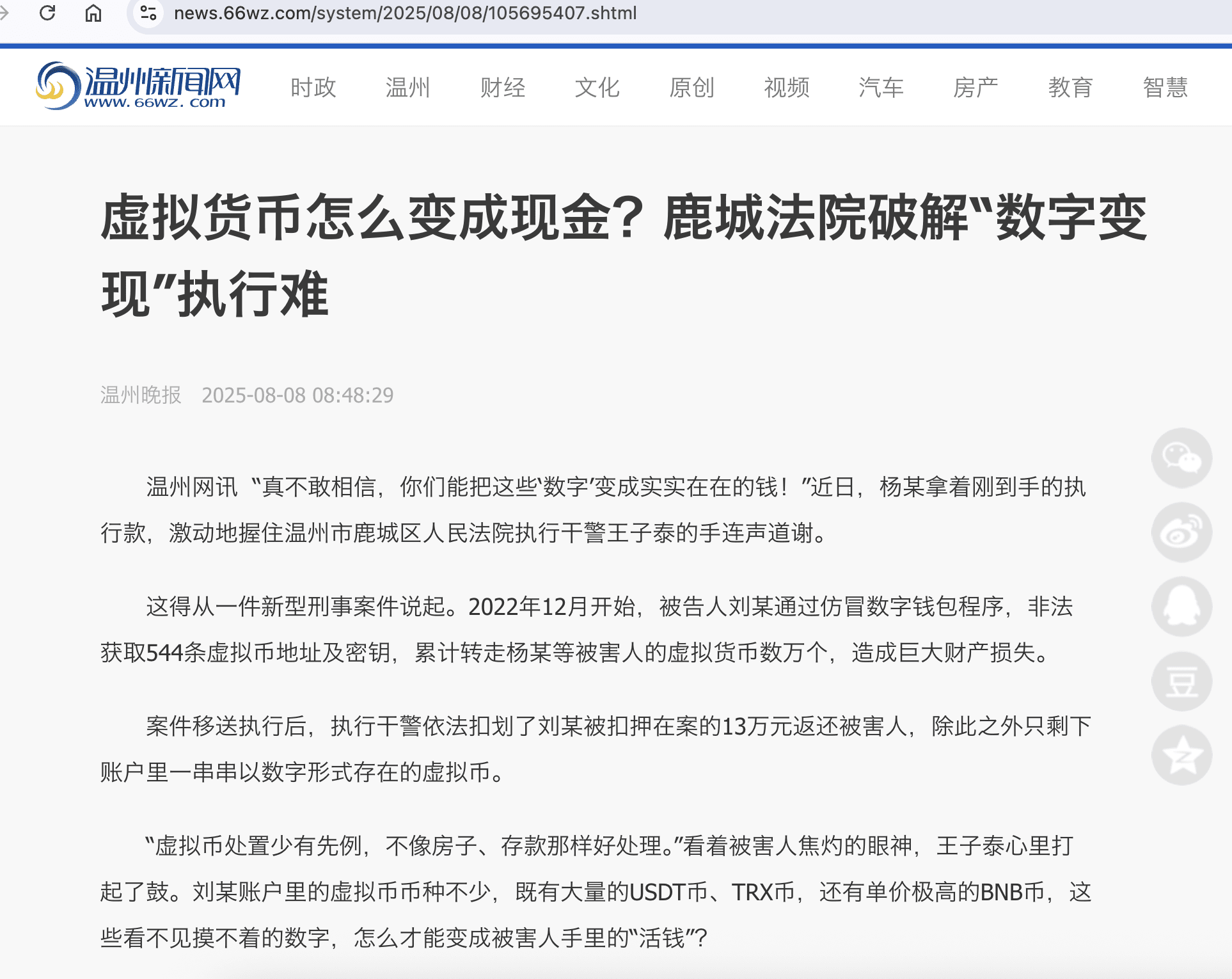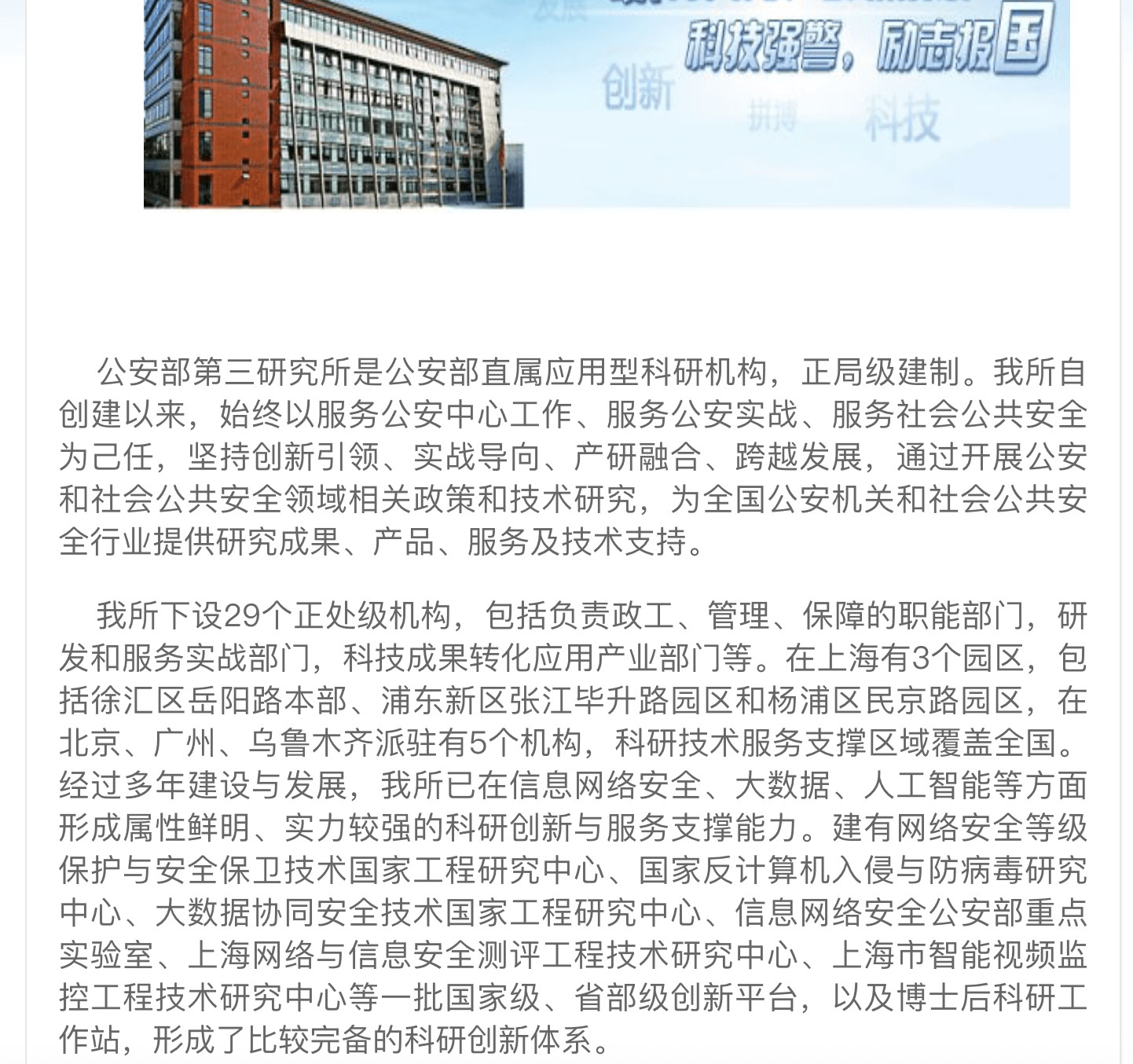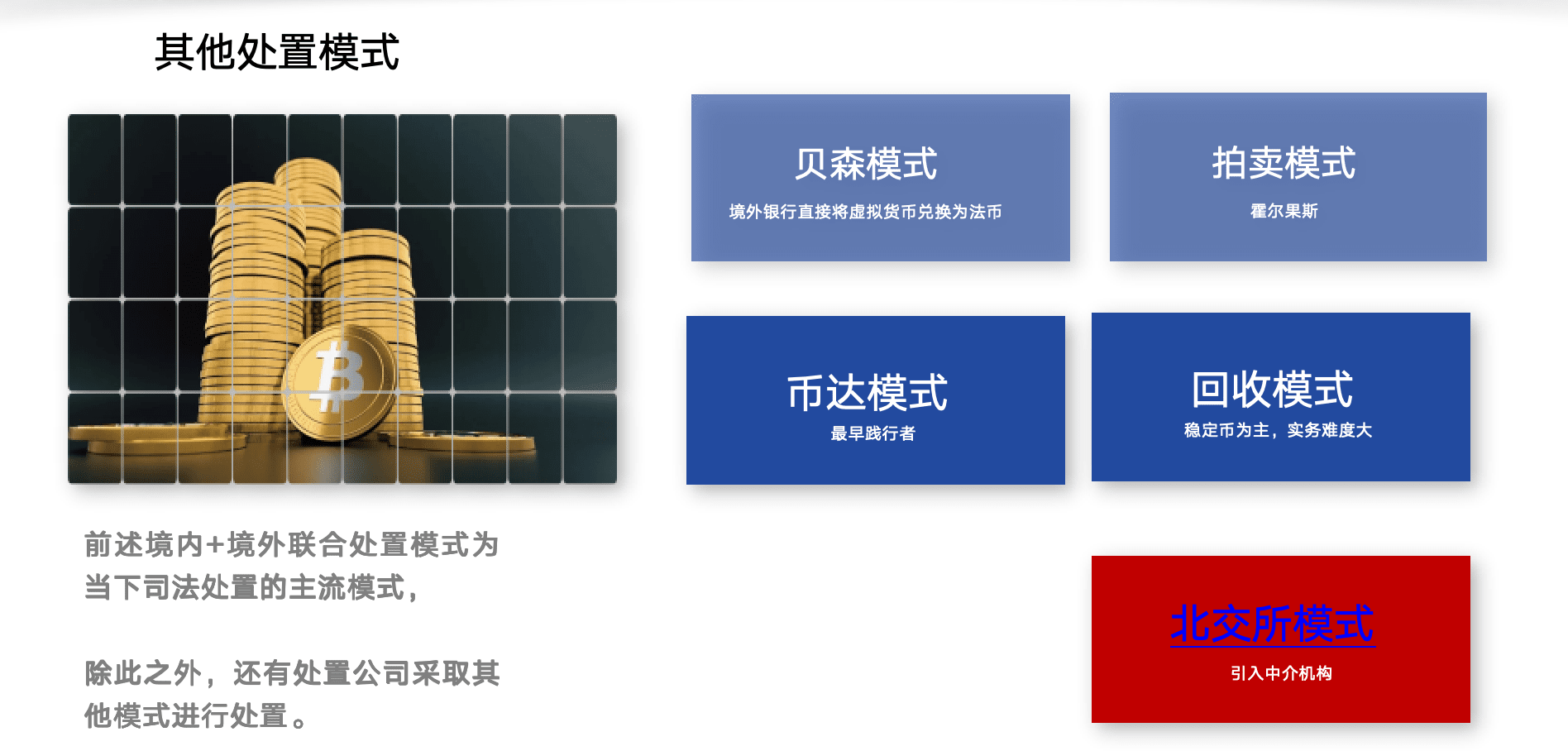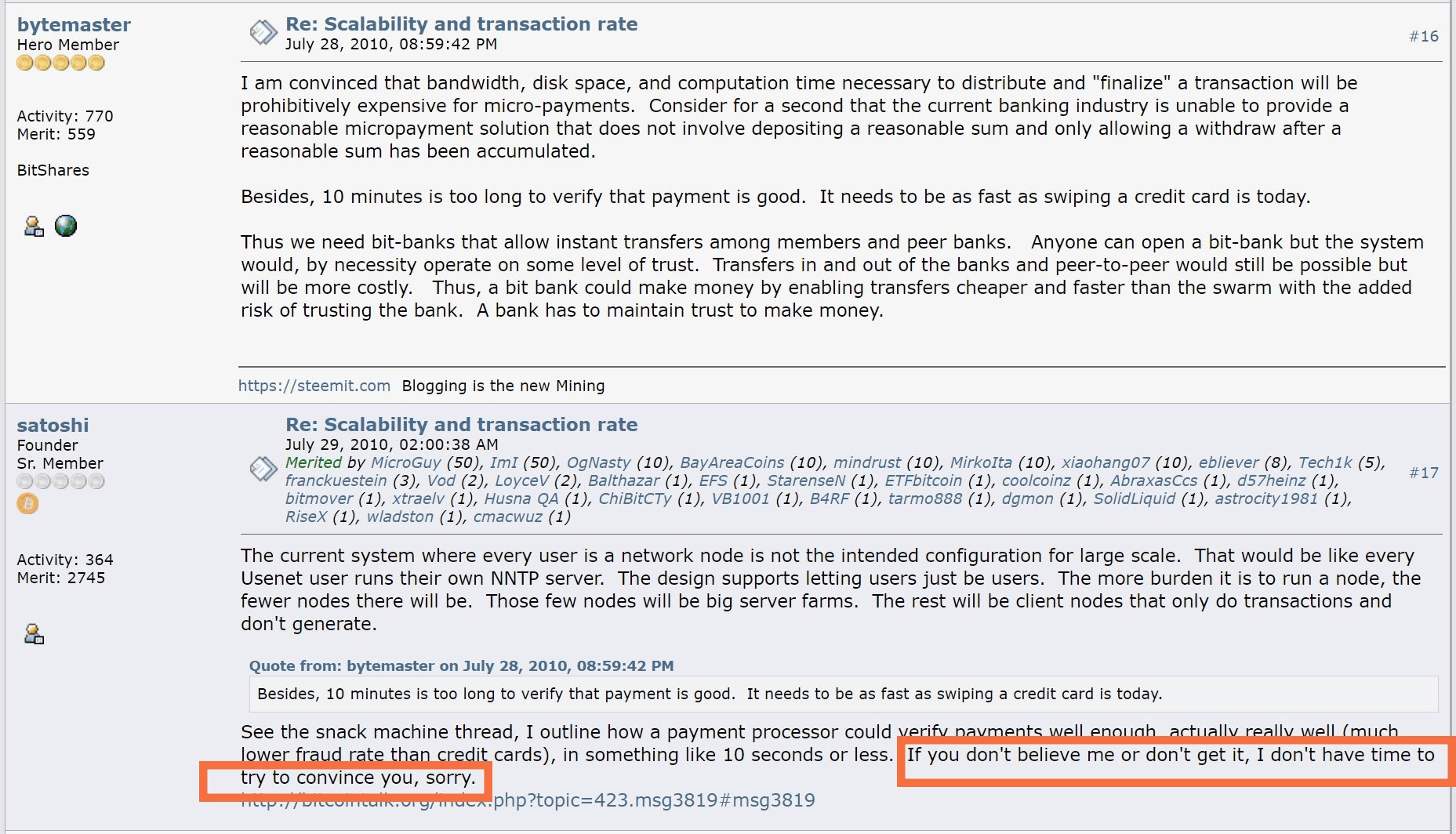Introduction
The judicial disposal business of involved virtual currencies is no longer a niche business; more and more people are becoming aware of it, understanding it, and even starting to participate in this business. Especially since this year, when the Beijing Municipal Public Security Bureau's Legal Affairs Division officially announced the judicial disposal of involved virtual currencies, there has been a noticeable increase in judicial disposal work across the country in the second half of the year.
In fact, helping judicial authorities dispose of and monetize frozen and seized virtual currencies has been done since around 2018, but at that time, there was no '9.24 notice' (Notification on Further Preventing and Handling Risks of Virtual Currency Trading Speculation) prohibiting any entities from engaging in virtual currency and legal currency exchange activities in mainland China. Therefore, domestic over-the-counter (OTC) traders could help judicial authorities convert involved virtual currencies into legal currency.
However, since the '9.24 notice', no entities are allowed to engage in virtual currency and legal currency exchange activities in mainland China. Therefore, facing the 'accumulated' virtual currencies, judicial authorities have no way to proceed. Some disposal companies have begun to construct a joint disposal model of domestic and overseas (the author first saw the introduction of this model in a paper by Suzhou Economic Investigation Team Leader Dick Chun); of course, there are other models running parallel in practice, including the most primitive model of directly disposing of and monetizing within the country (although the '9.24 notice' defines engaging in virtual currency and legal currency exchange activities as illegal financial activities).
On August 8, the Wenzhou News Network published an article (How to Turn Virtual Currency into Cash? Lucheng Court Solves the Execution Difficulty of 'Digital Monetization') which introduced a model used by the Lucheng District Court in Wenzhou City for the disposal and monetization of involved virtual currency. The author of this article refers to it as the 'Wenzhou model.'
I. Background Introduction
According to the article's introduction, in a criminal case involving virtual currency concluded by the Lucheng District Court in Wenzhou City, the defendant Liu illegally transferred tens of thousands of virtual currencies from victims including Yang. After the criminal judgment took effect, the court's enforcement bureau found that it was impossible to directly dispose of the involved virtual currency for legal currency within the country.
The court's enforcement officers contacted the Cybersecurity Brigade of the Lucheng Public Security Bureau, 'to study the disposal plan in accordance with the latest deployment requirements from the Supreme Court and the Ministry of Public Security regarding the exploration of disposal of criminal cases involving virtual currency.' The Lucheng Public Security contacted the Third Research Institute, which helped select mature professional disposal institutions and signed a disposal agreement.
Ultimately, the disposal and monetization of the involved virtual currency were completed through licensed exchanges. After deducting handling fees, the remaining monetized funds were transferred to the court's special account for the involved funds via an independent account of the public security department. A total of about 50,000 RMB was disposed of, consisting of 6000 USDT, 2700 TRX, and 0.8 BNB.

(Image source from Wenzhou News Network, see screenshot for URL)
II. Analysis of the 'Wenzhou Model'
According to the news introduction, the general outline of the 'Wenzhou model' is as follows: After the court's trial chamber concludes a criminal case, the case is transferred to the court's enforcement bureau for execution. The enforcement bureau then finds the local public security's cybersecurity brigade. At this point, it is unclear whether the involved virtual currency is still held by public security or has been transferred to the court's enforcement bureau; based on my practical experience, it is likely still held by public security.

(Image source from Wenzhou News Network)
The local public security bureau's cybersecurity brigade selected a professional disposal company through the Third Research Institute of the Ministry of Public Security (hereinafter referred to as 'the Third Research Institute'), and signed a disposal agreement. The disposal company then completed the disposal and monetization relying on licensed exchanges. After deducting the disposal handling fees, the disposal funds were first transferred to the public security department's account and then from the public security department to the court's special account for involved funds.
In this article, we can see that unlike the previous 'Beijing Stock Exchange model' where the First Research Institute of the Ministry of Public Security provided technical support, the Wenzhou model seems to have directly entrusted the Third Research Institute, which then selected the disposal company? If the article's expression aligns with objective facts, the role of the Third Research Institute here is akin to that of an intermediary.
The author checked the official website of the Third Research Institute, which is positioned as an applied research institution directly under the Ministry of Public Security.

(Image source from the official introduction of the Third Research Institute of the Ministry of Public Security)
News reports also mentioned that after the Third Research Institute selected a disposal company, the entrusting agency and the disposal company signed a trust agreement, but it did not specify whether it was the court or the public security department and the disposal company that signed the trust agreement. My personal judgment is that it was signed by the public security department, because ultimately the disposal funds were first transferred to the public security account and then to the court account. Logically, the disposal company should have signed a contract with the public security before transferring the disposal funds to the public security account.
The last point is that the Wenzhou model also relies on licensed exchanges for disposal and monetization abroad, but it is not particularly clear whether this 'licensed exchange' refers to a virtual currency exchange or another licensed institution.
III. Introduction to Judicial Disposal Business Models
Since June of this year, my team and Director Luo Wenlong from Zhi Heng Law Firm have shared the defense and judicial disposal practices of criminal cases involving virtual currency at the law firm's headquarters and various branches, as well as at industry seminars related to virtual currency.
Currently, apart from the domestic and overseas joint disposal model, there are actually various models running parallel as shown in the figure below. Some places still adopt the most primitive approach of OTC in mainland China buying virtual currency from public security for disposal.

IV. Conclusion
Few judicial activities can spark as much controversy as the judicial disposal of virtual currency, both theoretically and practically. This is closely related to the overall regulatory policy for virtual currency in mainland China, regarding a technology that regulators dislike but cannot completely ban (yes, in the author's view, virtual currency is merely a facade, while the underlying technology is represented by blockchain). Rather than blocking it, it is better to guide it.
After the U.S. passed the Genius Act, Hong Kong also attempted to open up Web3 to a certain extent, such as through a Hong Kong-style stablecoin issuance system. This actually reflects the different political systems' attitudes toward the emerging phenomenon of virtual currency.

Satoshi Nakamoto once replied in an email: “If you don’t believe me or understand me, I don’t have the time to convince you, sorry.”



